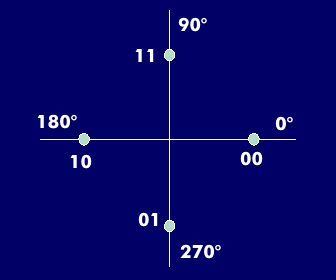differential phase shift keying (Modulation) (DPSK)
Differential phase shift keying (DPSK) is a modulation specifically for data transmission in which the data is transmitted by changing the phase of the carrier oscillation.
Differential phaseshift keying (DPSK) is a further development of phase shift keying( PSK), but has the advantage that clock recovery is possible from the modulated signal, unlike binary phase shift keying(BPSK) and quadrature phase shift keying( QPSK) where ambiguities can occur if the phase position changes during transmission. To avoid this, the phase changes are modulated in the DPSK method. The method works with two carrier signals whose phase positions are offset by 90° from each other and which are modulated with two signal components. The clock can be derived from the phase position, since the phase position of the carrier frequency changes after each transmitted character.
When encoding a dibit, the four states are assigned the phase angles 0° for 00, 90° for 01, -90° for 10 and 180° for 11. DPSK is also used in DigitalAudio Broadcast( DAB) and Bluetooth, among others.

